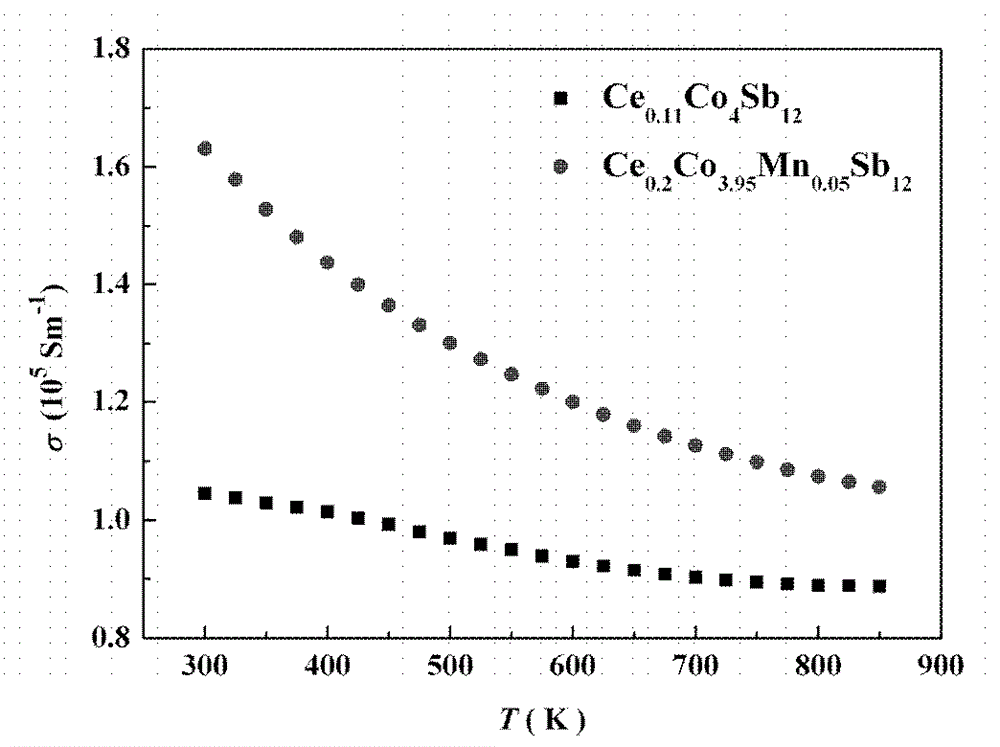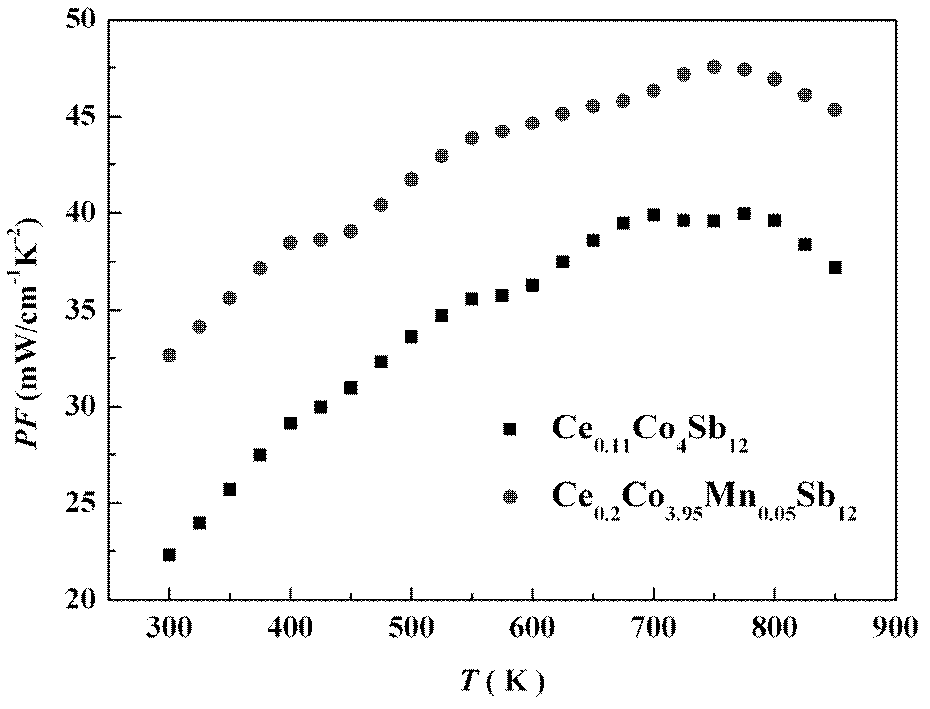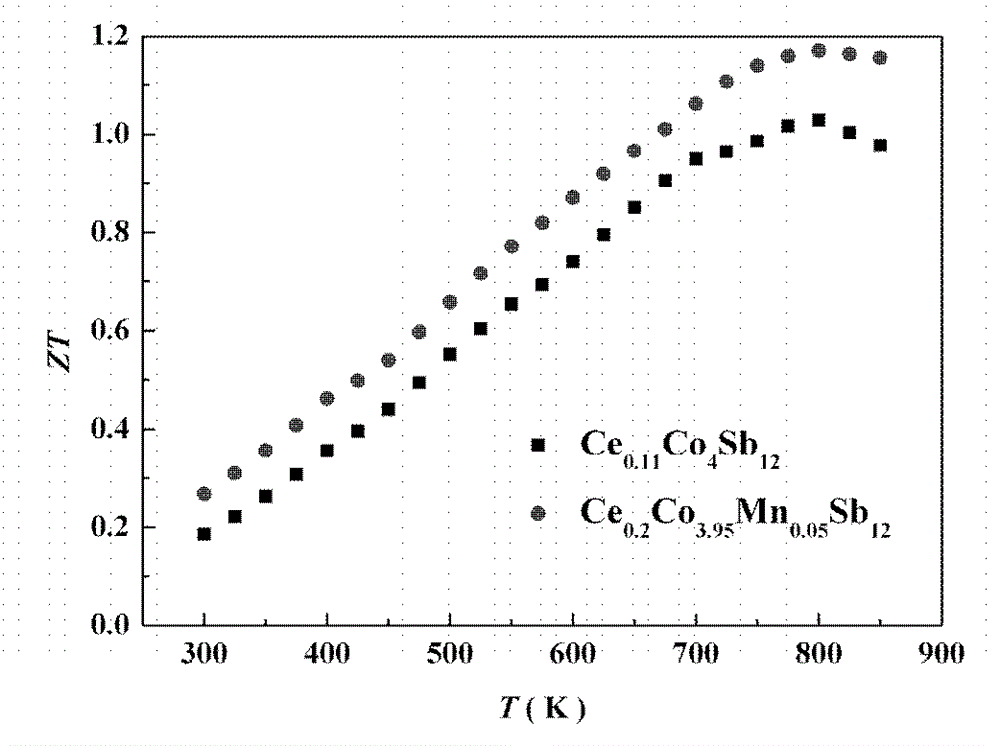Hole-compensated skutterudite thermoelectric material and preparation method thereof
A hole-compensating, thermoelectric material technology, applied in the direction of thermoelectric device junction lead-out materials, chemical instruments and methods, cobalt compounds, etc., to achieve the effect of increased conductance and power factor, good industrialization prospects, and easy control
- Summary
- Abstract
- Description
- Claims
- Application Information
AI Technical Summary
Problems solved by technology
Method used
Image
Examples
Embodiment 1
[0131] Example 1: n-type material
[0132] Ce 0.2 co 3.95 mn 0.05 Sb 12 / zNC(z=0) material
[0133] The high-purity metal raw materials Ce, Co, Mn, and Sb were mixed in a glove box according to the molar ratio of 0.2:3.95:0.05:12. The mixture was placed in a quartz tube with a carbon film on the inner wall, and the vacuum was pumped while using argon. The gas plasma flame is used for packaging, and the quartz tube is filled with a small amount of Ar gas for protection. The mixed raw materials were heated to 1100° C. at a rate of 3° C. / min and melted for 12 hours. Quenching is carried out after melting, the quenching medium is brine, and the quenching speed is about 300°C / s. After quenching, the quartz tube was annealed at 800° C. for 120 hours, and the obtained block was ground into fine powder and then spark plasma sintered. The sintering temperature was 600° C., the holding time was 5 minutes, and the pressure was 50 MPa. Thermoelectric performance tests reveal hole...
Embodiment 2
[0134] Example 2: p-type material
[0135] Ce 0.95 Fe 3.8 mn 0.2 Sb12 / zNC(z=0) material
[0136] The metal raw materials Ce, Fe, Mn, and Sb are mixed in the glove box according to the molar ratio of 0.95:3.8:0.2:12, and the raw materials are sealed in a quartz tube with a carbon film evaporated on the inner wall, and the vacuum is drawn while using argon plasma The flame is used for packaging, and the quartz tube is filled with a small amount of Ar gas for protection. The mixed raw materials were heated to 1100° C. at a rate of 3° C. / min and melted for 12 hours. Quenching is carried out after the melting is completed, the quenching medium is brine, and the quenching speed is about 300°C / s. The quenched ingot and the quartz tube were annealed at 600°C for 200 hours. The block was ground into fine powder and then spark plasma sintered. The sintering temperature was 600°C, the holding time was 10 minutes, and the pressure was 60MPa. EPMA shows that the components of the s...
Embodiment 3
[0137] Example 3: p-type material
[0138] Ce 0.95 Fe 3.35 co 0.5 mn 0.15 Sb 12 / zNC(z=0) material
[0139] The metal raw materials Ce, Fe, Co, Mn, and Sb are mixed in the glove box according to the molar ratio of 0.95:3.8:0.2:12, and the raw materials are sealed in a quartz tube with a carbon film on the inner wall. The gas plasma flame is used for packaging, and the quartz tube is filled with a small amount of Ar gas for protection. The mixed raw materials were heated to 1100° C. at a rate of 3° C. / min and melted for 12 hours. Quenching is carried out after the melting is completed, the quenching medium is brine, and the quenching speed is about 300°C / s. The quenched ingot and the quartz tube were annealed at 600°C for 200 hours. The block was ground into fine powder and then spark plasma sintered. The sintering temperature was 600°C, the holding time was 10 minutes, and the pressure was 60MPa. EPMA shows that the components of the sample are evenly distributed in ...
PUM
| Property | Measurement | Unit |
|---|---|---|
| particle size | aaaaa | aaaaa |
| melting point | aaaaa | aaaaa |
Abstract
Description
Claims
Application Information
 Login to View More
Login to View More - R&D
- Intellectual Property
- Life Sciences
- Materials
- Tech Scout
- Unparalleled Data Quality
- Higher Quality Content
- 60% Fewer Hallucinations
Browse by: Latest US Patents, China's latest patents, Technical Efficacy Thesaurus, Application Domain, Technology Topic, Popular Technical Reports.
© 2025 PatSnap. All rights reserved.Legal|Privacy policy|Modern Slavery Act Transparency Statement|Sitemap|About US| Contact US: help@patsnap.com



